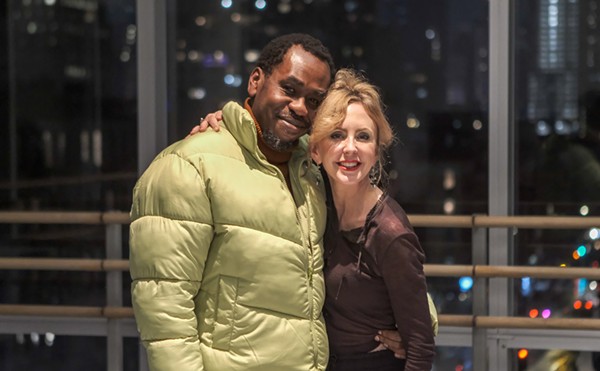Award-winning mezzo-soprano Denyce Graves knew she wanted to be a professional opera singer early on. One day a friend asked the 14-year-old Graves to skip class and listen to a recording of Puccini arias sung by legendary African-American opera diva Leontyne Price at the school library. "We listened until they threw us out," says Graves. "I was in awe of this black woman singing like that. She was so great. I felt an incredible sense of pride."
Graves pursued her dream with a fierce determination worthy of Bizet's gypsy siren Carmen, a role she has performed in opera houses around the globe and which critics have heralded as "the definitive Carmen of the '90s." At 33 -- what many would deem infancy in the opera world -- she has sung opposite Jose Carreras and Placido Domingo, recorded with musician Philip Glass, appeared in numerous PBS specials and even harmonized with President Clinton at the White House. And she performs this weekend for the Orlando Opera's 40th Anniversay Gala. Yet she speaks modestly of her talent.
"I really love what I do," says Graves from her home in Leesburg, Va. "Singing fills me with joy. The greatest sense is not being out on stage, but just singing. I am honored that I can sing in some of the most prestigious opera houses, but I have to think of it as just another performance. ... Afterwards I have the luxury of looking back. If I stopped to think about where I was, I'd be sunk!"
When she applies her naturally warm, resonant voice to the emotional nuances of opera, it deepens and shimmers with sensual luster that is perfectly suited for the temptress Carmen, who entices, seduces then rejects soldier Don José in 19th-century Seville. Graves catapulted into the limelight in October 1995 when she debuted in the title role of "Carmen" at the Metropolitan Opera in New York. "She would be scandalous today," Graves says. "She's a very strong woman who knows exactly who she is and does not care what other people think. She can come across as loose and sexually liberated, but I see her as a queen of her environment, a woman in charge of her own life and governed by herself."
Graves has come a long way from the tough Washington, D.C., neighborhood of her childhood. Her father abandoned her family when she was a year old, leaving her mother to raise three young children. Music was an integral part of Graves' youth. She participated in her church's choir and attended the Duke Ellington School of the Performing Arts, completing her studies at Oberlin College Conservatory and New England Conservatory. Her career blossomed in March 1988 when she made the finals in the Metropolitan Opera's Young Artists Program. En route to New York she suffered a mysterious voice ailment and had to withdraw. It took 12 doctors to discover a treatable thyroid problem, and even after she recovered the Houston Grand Opera had to call three times before she agreed to audition for their young artist program -- and was immediately accepted.
"Even when I was fine, and under the best conditions, I had not sung as well," she recalls. "I was hungry for it. I had missed it. I felt renewed."
Fortuitously, in 1989 the Houston Opera cast her in the supporting role of Emilia in "Otello," in which Domingo had the title role. He recognized her talent, and personally asked her to play opposite him in Saint-Saens's "Samson and Delilah" at the 1992 Ravinia Festival. Following this success, she toured Europe and performed in the world's biggest opera venues including those of London, Vienna, Paris, Berlin, Munich, Geneva and Verona. "My hope is that the audience has a beautiful musical experience that they remember for years," says Graves.
Graves has bookings for "Carmen" and "Samson and Delilah" into the next century and will perform in 37 cities this year. Most recently, she finished recording "Civil Wars," a collaboration between musician Philip Glass and librettist Robert Wilson that was composed 15 years ago but lacked a mezzo-soprano. Glass heard Graves sing at the White House and enlisted her to finish the evocative work based on the American and other civil wars.
"The distance has been great, no doubt about that," Graves says of how far she's come since that fateful day at the library. "I do see myself in a position of privilege. I'm psyched to be here."

















